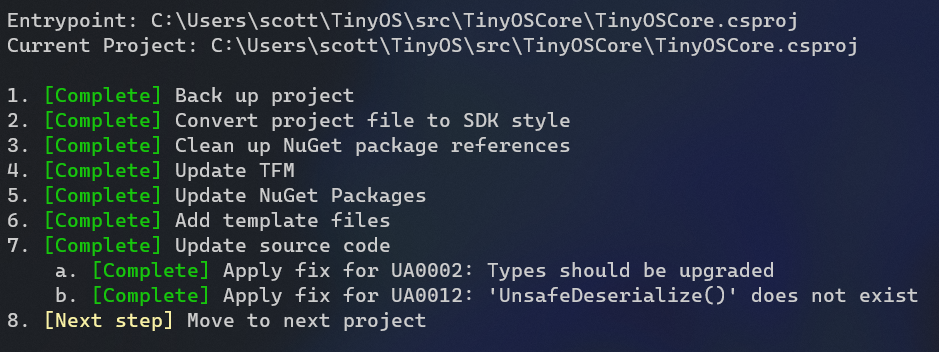[ad_1]
I wrote a Tiny Digital Working System for a 300-level OS class in C# for faculty again in 2001 (?) and later moved it to VB.NET in 2002. That is all pre-.NET Core, and on early .NET 1.1 or 2.0 on Home windows. I moved it to GitHub 5 years in the past and ported it to .NET Core 2.0 on the time. At this level it was 15 years previous, so it was cool to see this challenge working on Home windows, Linux, in Docker, and on a Raspberry Pi…a machine that did not exist when the challenge was initially written.
NOTE: If the timeline is complicated, I had already been working in business for years at this level however was nonetheless plugging away at my 4 12 months diploma at night time. It will definitely took 11 years to finish my BS in Software program Engineering.
This night, as the kids slept, I needed to see if I may run the .NET Improve Assistant on this now 20 12 months previous app and get it working on .NET 6.
Let’s begin:
$ upgrade-assistant improve .TinyOS.sln
-----------------------------------------------------------------------------------------------------------------
Microsoft .NET Improve Assistant v0.3.256001+3c4e05c787f588e940fe73bfa78d7eedfe0190bdWe're fascinated by your suggestions! Please use the next hyperlink to open a survey: https://aka.ms/DotNetUASurvey
-----------------------------------------------------------------------------------------------------------------[22:58:01 INF] Loaded 5 extensions
[22:58:02 INF] Utilizing MSBuild from C:Program Filesdotnetsdk6.0.100
[22:58:02 INF] Utilizing Visible Studio set up from C:Program FilesMicrosoft Visible Studio2022Preview [v17]
[22:58:06 INF] Initializing improve step Choose an entrypoint
[22:58:07 INF] Setting entrypoint to solely challenge in answer: C:UsersscottTinyOSsrcTinyOSCoreTinyOSCore.csproj
[22:58:07 INF] Recommending executable TFM net6.0 as a result of the challenge builds to an executable
[22:58:07 INF] Initializing improve step Choose challenge to improve
[22:58:07 INF] Recommending executable TFM net6.0 as a result of the challenge builds to an executable
[22:58:07 INF] Recommending executable TFM net6.0 as a result of the challenge builds to an executable
[22:58:07 INF] Initializing improve step Again up challenge
See how the method is interactive on the command line, with shade prompts and a collection of dynamic multiple-choice questions?

Apparently, it builds on the primary attempt, no errors.
After I manually take a look at the .csproj I can see some bizarre model numbers, seemingly from some not-quite-baked model of .NET Core 2 I used a few years in the past. My spidey sense says that is improper, and I am assuming the improve assistant did not perceive it.
<!-- <PackageReference Embody="ILLink.Duties" Model="0.1.4-preview-906439" /> -->
<PackageReference Embody="Microsoft.Extensions.Configuration" Model="2.0.0-preview2-final" />
<PackageReference Embody="Microsoft.Extensions.Configuration.Json" Model="2.0.0-preview2-final" />
<PackageReference Embody="Microsoft.Extensions.DependencyInjection" Model="2.0.0-preview2-final" />
<PackageReference Embody="Microsoft.Extensions.Choices.ConfigurationExtensions" Model="2.0.0-preview2-final" />
I additionally be aware a commented-out reference to ILLink.Duties which was a preview characteristic in Mono’s Linker to scale back the ultimate measurement of apps and tree-trim them. A few of that performance is constructed into .NET 6 now so I will use that through the construct and packaging course of later. The reference isn’t wanted at this time.
I am gonna blindly improve them to .NET 6 and see what occurs. I may do that by simply altering the numbers and seeing if it restores and builds, however I also can attempt dotnet outdated which stays a stunning instrument within the upgrader’s toolkit.

This “outdated” instrument is good because it talks to NuGet and confirms that there are newer variations of sure packages.
In my checks – which had been simply batch information at this early time – I used to be calling my dotnet app like this:
dotnet netcoreapp2.0/TinyOSCore.dll 512 scott13.txt
This may change to the trendy type with simply TinyOSCore.exe 512 scott13.txt with an exe and args and no ceremony.
Publishing and trimming my TinyOS turns into only a 15 meg EXE. Good contemplating that the .NET I want is in there with no separate set up. I may flip this little artificial OS right into a microservice if I needed to be completely further.
dotnet publish -r win-x64 --self-contained -p:PublishSingleFile=true -p:SuppressTrimAnalysisWarnings=true
If I add
-p:EnableCompressionInSingleFile=true
Then it is even smaller. No code modifications. Run all my checks, seems good. My challenge from college from .NET 1.1 is now .NET 6.0, cross platform, self-contained in 11 megs in a single EXE. Candy.
Sponsor: At Rocket Mortgage® the work you do round right here might be 100% impactful however gained’t take all of your free time, supplying you with the right work-life steadiness. Or as we name it, tech/life steadiness! Be taught extra.
About Scott
Scott Hanselman is a former professor, former Chief Architect in finance, now speaker, guide, father, diabetic, and Microsoft worker. He’s a failed stand-up comedian, a cornrower, and a ebook writer.
[ad_2]


